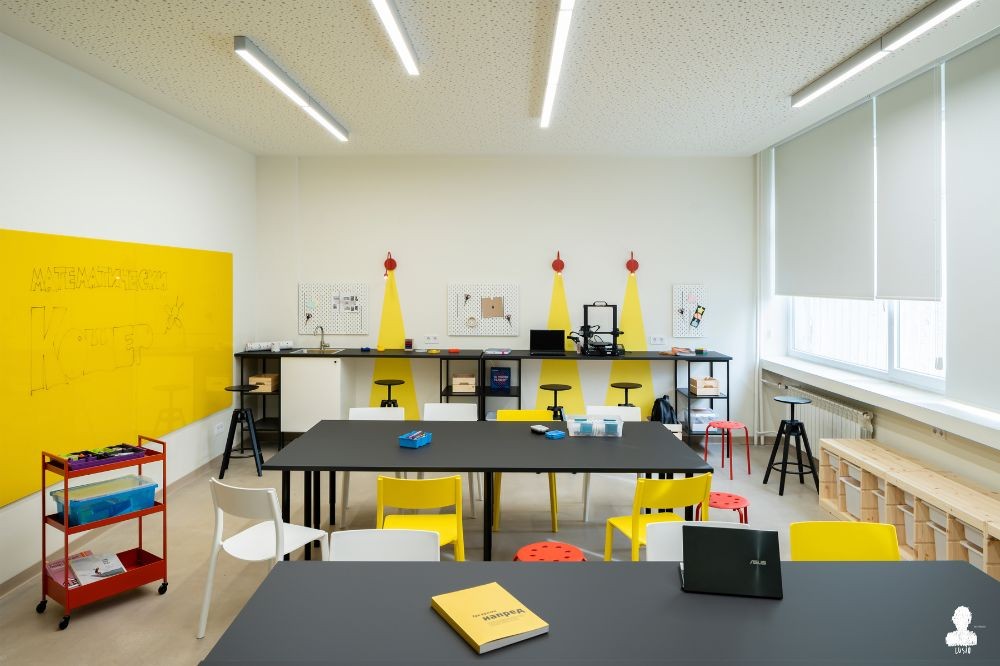 7
7
The first weeks of the new school year always pass quickly because of the euphoria of the students after the vacation and their attempts to preserve the summer carefree mood for just a little longer. But for some people, each start of the school year is associated with the hope that changes will occur, stimulating both teachers and students to rediscover knowledge as a shortcut to the future. According to them a change in the learning environment stimulates interest in the educational process.

“All of our projects usually open on September 15. Then children and parents see the effect of our intervention in the environment. When people see the good examples, they should start demanding that such changes take place in all schools,” architects Violetka Slavova and Maria Staynova told Radio Bulgaria. “In addition, we hope to stimulate more and more teachers to use different teaching methods, because the environment we create most often contradicts the previous style in which the educational process was carried out. It will also help children recognize school as a place where they can stay after the end of the classes.”
The idea was born by chance. During a competition for the creation of the so-called STEM-centers at school, the two architects choose to dedicate their work to the construction and improvement of buildings that are part of the educational infrastructure in this country.

The way they develop their projects may surprise some of their colleagues. The two often choose multi-sensory materials when designing a space.
"This type of design is aimed at children with more specific needs,” the architects say. “The environment they are in plays an extremely important role for their adaptation and ability to communicate more calmly with others. This is where the so-called multi-sensor design comes in, providing the possibility of different illumination, brightness of colors, diversity in appearance and texture of surfaces, sound level and others. However, all children, regardless of their needs, could benefit from such an environment."
The projects are implemented after a number of meetings and discussions both with the teachers in the respective school and with their students, whose ideas are often realised after the relevant interpretation.

"Once, students asked us for a room with waterproof flooring and a large sink in the center of it. They told us it would be wonderful for them to have more access to water. We have not created such a room, but in our projects we envisage placing drinking water fountains in various spaces in the school. Children also want to have something soft around them, the ability to sit differently, to move around, etc.''
The hope that at some point the school buildings in this country would start to be seen as a resource that can be used by everyone who needs it fuels Violetka and Maria’s big dreams:
"In an ideal world we see school buildings that could be used by all the people in the neighborhood. It is a great loss for us when such a huge building stock and huge yard spaces are closed during the summer and cannot be accessed. So far we've only had a few conversations on the subject with school principals, but we haven't identified concrete steps yet. However, they realize that these spaces could look way different than the huge asphalt-covered areas we usually see.”

There are thousands of possibilities for turning them into spaces preferred by students and those living nearby, but for this purpose a complete rethinking of the learning environment is necessary, whether it is inside or outside the school building.
English: Al. Markov
Photos: personal libraryGeneration Z students (born 1995–2012) are widely using artificial intelligence in their learning, with teachers reporting that more than 85% complete homework and study with the help of digital assistants. Children tend to see AI as a partner..
This year, Christmas has "arrived" in Sofia as early as November with the aroma of mulled wine, cinnamon and festive magic. Radio Bulgaria recommends that you visit some Christmas spots in the Bulgarian capital city: For those most impatient to..
Three-time world champion and Olympic weightlifter Carlos Nasar will be holding a special event with the Bulgarian community in London on 23 November. According to the organisers, it will be an open conversation in which Nasar will discuss his journey..
From fear and doubts to joy and support – Bulgarians react differently to the upcoming introduction of the euro on January 1, 2026. For..
On November 21–22, 2025, the 11th edition of the Career Fair will take place at the John Atanasov Hall in Sofia Tech Park. The forum aims to support..
Bulgaria celebrates National Reading Day on the third Friday of November. The Reading Foundation is leading the initiative under the motto: “Read. For..

+359 2 9336 661
